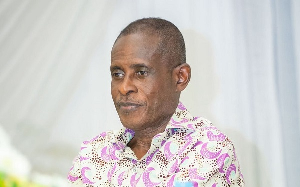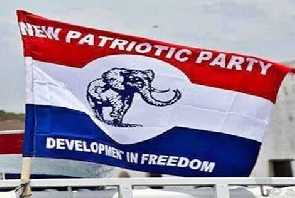Democracy in Ghana has endured since the country’s return to constitutional rule in 1992. Two major political parties have been vibrant and have ruled the country for 16 years apiece since then. The major challenge for these parties is winning three consecutive elections. In this article, I discuss the issue of “breaking the eight” in Ghanaian politics and how it has become difficult for these parties to achieve this feat.
Ghana is currently in its Fourth Republican constitutional era, which means there have been three previous constitutions since 1960. Each time a constitution is halted or toppled marks the end of that constitutional era. There have been several military interventions that interrupted constitutional rule. The last military intervention in Ghana was on December 31, 1981, by the late Air Force Flight Lieutenant John Jerry Rawlings against the then Dr. Hilla Limann government under the Third Republic.
J.J. Rawlings ruled as the military head for more than a decade before Ghanaians called for a return to democracy. A referendum was conducted in 1992, and over 90% of Ghanaians voted yes for democracy. This led to the drafting of a new constitution and the beginning of another dispensation. It also allowed people or groups to establish political parties to participate in the presidential election in November 1992.
As is evident in every multi-party democracy, two political parties emerged as popular with their ideology and populism: the National Democratic Congress (NDC) and the New Patriotic Party (NPP). These two parties have since been the dominant forces in Ghanaian politics.
In the 1992 general elections, the then military government led by Mr. Rawlings and his Provisional National Defence Council (PNDC) had transformed into a new political party, the NDC, and was ready to contest the election. The NPP was led by the eminent professor of history Adu Boahene. At the end of the election, the former military leader had become the new president of the Fourth Republic.
Mr. Rawlings won a second term election against a new flagbearer of the NPP, Mr. John Agyekum Kufuor. This meant that Mr. Rawlings was serving his last term as president as stipulated in the 1992 constitution. After his tenure, the NDC had spent eight years in office and was seeking to win a third consecutive term with a different candidate.
In the December 2000 election, the NDC was led by the then Vice President Prof. Evans Atta Mills. This time, the NDC sought to win the election to continue their administration, but unfortunately, they were defeated by the NPP and its candidate Mr. Kufuor. This was the first time the NPP had won an election since Ghana’s return to multi-party democracy under the Fourth Republic.
Many factors contributed to the NDC's defeat, including economic difficulties, a high rate of unemployment, and incumbency disadvantage. These factors made it difficult for Prof. Mills and the NDC to convince Ghanaians to vote for them again. After the two main parties failed to get the required percentage (50% plus 1) to win the first round, the election ended in a run-off after 21 days. The NPP, with their flagbearer Mr. Kufuor, emerged as the winner with an overwhelming endorsement from Ghanaians.
Mr. Kufuor won his second term against a familiar foe, Prof. Mills, of the NDC. Ghanaians appreciated the good governance of the NPP and decided to give them another term. The NDC did their best but was unsuccessful. They would try another time.
In the 2008 general elections, Mr. Kufuor was not eligible to contest as he had finished his tenure of office, but his party, the NPP, had the chance to field another candidate to face the old face of the NDC, Prof. Mills. The NPP presented Mr. Nana Addo Dankwa Akufo-Addo.
The 2008 general elections presented some interesting dimensions of Ghanaian politics. It was the third time the NDC candidate, Prof. Mills, was contesting, and the NPP was trying to win a third consecutive term. Both incumbency advantage and incumbency disadvantage played crucial roles in ensuring the NPP lost the election; incumbency advantage because the NPP candidate had all state apparatus at his disposal, and incumbency disadvantage because the people of Ghana were tired of the NPP and the economic difficulties they had brought. Other pertinent issues included an increase in armed robbery and water challenges.
Another interesting aspect of the 2008 election was that even after the run-off, there was no clear winner between Prof. Mills and Mr. Akufo-Addo. The Electoral Commission organized a “mini-election” for the people of Tain in the then Brong Ahafo Region because they could not participate in the main election earlier. It was after the results of the Tain election came in that Ghanaians got a new president-elect with a few days for him to assume office.
This was the second time a political party had failed to win a third consecutive term in Ghana. The NDC could not do so in the 2000 election, and the NPP also could not do it in 2008.
A few months before the 2012 election, the sitting President, Prof. Mills, died, paving the way for Mr. Mahama to take charge as the interim president. The NDC quickly affirmed Mr. Mahama as their candidate to face NPP’s Mr. Akufo-Addo. Mr. Mahama won the 2012 election for the NDC, making it a second term for them. The NPP and Mr. Akufo-Addo did not accept the outcome of the election and decided to go to court. After about eight months of electoral dispute, the court ruled against the NPP and reaffirmed that Mr. Mahama won the election.
Prior to the 2016 election, the NDC administration faced many difficulties, bringing untold hardship to Ghanaians: Dumsor (power challenges), a popular issue, coupled with severe economic challenges. Despite this, Mr. Mahama sought his second term in office while his party sought a third term win, which had never happened in Ghana. The NDC strategically presented Mr. Mahama as someone seeking a second term, while the NPP used the third term mantra against them.
With a plethora of promises by the NPP, coupled with economic hardship and incumbency disadvantage, the NPP and Mr. Akufo-Addo won the 2016 election overwhelmingly. If Mr. Mahama had won, he would have secured a third term for the NDC and a second term for himself, but this did not happen.
In the 2020 election, Mr. Akufo-Addo and the NPP won a second term against the NDC and their candidate Mr. Mahama. Mr. Mahama did not accept the results of the election and went to court. After about three months of dispute, the court upheld the results of the election and dismissed the case with a unanimous decision by the Supreme Court.
According to the Constitution of Ghana, Mr. Akufo-Addo is not eligible to contest again, and the NPP has elected Dr. Mahamudu Bawumia, the Vice President, as their flagbearer against Mr. Mahama of the NDC. In the past two years, the NPP has promoted the slogan "breaking the 8," which means they aim to do something unprecedented in Ghanaian politics: winning a third term under the Fourth Republic. This has been their rhetoric for over two years.
Currently, economic challenges in Ghana are unbearable for many Ghanaians. The suffering is unprecedented, and it is difficult for the average Ghanaian to afford a good meal a day. The plethora of promises made by the NPP government are not seen and felt by many Ghanaians. With all these challenges, it is difficult to comprehend how the NPP plans to “break the eight” and win a third term. The state of the country is deteriorating, and there is no clear leadership. It therefore defies common sense and logic for the NPP to aim for a third consecutive term. However, whether this is possible or not depends on the decision Ghanaians make.
Former President Mahama wants to make a political comeback while the NPP wants to break the eight-year cycle in Ghanaian politics; interesting times lie ahead. Given the current situation and condition in Ghana, it is difficult for any candidate to campaign and convince Ghanaians to vote for them. Some people also do not want a second coming of Mr. Mahama, as they recall unpleasant memories from his previous term.
If history is anything to go by, and if Ghanaians remain consistent with their voting patterns during each party’s third term attempt at the polls, then the outlook is not favourable for the NPP and Dr. Bawumia. We shall witness another historic election this year.
Opinions of Tuesday, 19 November 2024
Columnist: Boamah Sampson
Breaking the eight in Ghanaian politics
Opinions














